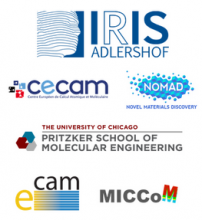The event is planned in terms of two stages: a high-level CECAM workshop and a subsequent hands-on tutorial. Both activities address the concepts and implementations that are needed in order to link the Quantum Mechanical (QM) description of electrons in materials, to the statistical mechanics principles that address the larger time and length scales governing real-life situations.
During the first 3 days, the workshop will focus on recent and important developments addressing exascale scientific computing applications and related artificial intelligence (AI) methods, with a specific focus on urgent and critical aspects in the domain of computational materials science. In particular, we will address how exascale computing can contribute to the enhanced performance of materials modeling, in terms of higher accuracy, precision and degree of inter-operability between different modeling length- and time-scales. These technical aspects will be presented and discussed by leading experts in different domains, thus giving the opportunity to explore similarities and differences in the various current state-of-the-art approaches towards exascale computing, as well as the management of modeling workflows and corresponding output data of interesting materials properties.
Then the following 2 days will consist of tutorials and hands-on demonstrations that will focus on recent progress in (1) first principles simulations and (2) advanced sampling methods and software, and (3) the coupling of first principles molecular dynamics simulations and advanced sampling methods. In particular, examples using the Qbox code coupled with with the SSAGES suite of codes and I-Pi will be discussed in detail, with several hands-on examples.
General Scope
Real materials are not necessarily in thermal equilibrium, and a careful understanding of the micro-structure of any material (e.g. grains and grain boundaries) is crucial for the estimation of important materials properties and functions. Thus, QM techniques have necessarily to be connected to molecular mechanics (MM), large-scale molecular dynamics (MD), kinetic Monte Carlo (kMC), and computational fluid dynamics (CFD), just to name a few methodologies. Very importantly, we need robust connections between all such modelling techniques, including a detailed understanding of the various errors and uncertainties involved. Moreover, in order to properly interpret the corresponding results, we need all such inter-connections to be fully reversible, i.e. not just able to transition from small to large scales but also conversely.
The Handbook of Materials Modeling (2005) is one of the main classical references in this domain of scientific computing [1], and its 2nd edition has since appeared in 2020 [2]. This has now turned into a six-volume major review masterwork, reflecting the significant developments in all aspects pertaining to computational materials research over the past decade or so, including major progress in the formulation of increasingly realistic multi-scale modeling approaches, workflows and models. However, two recent innovations in materials modeling applications are still relatively poorly and sparsely covered in the currently available review literature, namely exascale computing and related artificial intelligence (AI)-based methods. These two topics will be the main focus of our attention within our proposed workshop and associated tutorial school.
[1] Handbook of Materials Modeling, 2005, S. Yip (ed), ISBN 978-1402032875, Springer, Cham
[2] Handbook of Materials Modeling, 2nd ed., 2020, W. Andreoni and S. Yip (eds), ISBN 978-3319788760, Springer, Cham
Format
The event will start with a high-level workshop (3 days). Talks, discussions, and poster sessions will be held as a regular meeting involving the physical presence of all participants (some but very few talks may be presented virtually).
Each of the five main sessions during the first part of the workshop (throughout the first three days) will start with an introduction (15 minutes) by a renowned scientist, the so-called “moderator” for that particular session. The subsequent talks in the corresponding session will then last for 30 minutes each, and will be followed in turn by 10 minutes of general Q&A discussion.
The following 2-day hands-on tutorial will include coupling first principles molecular dynamics simulations and advanced sampling methods using the Qbox code coupled with with the SSAGES suite of codes and I-Pi. Several examples will be discussed with hands-on demonstrations, and opportunities will be provided for students to develop simulation strategies of direct relevance to their own research with the help of expert instructors.
